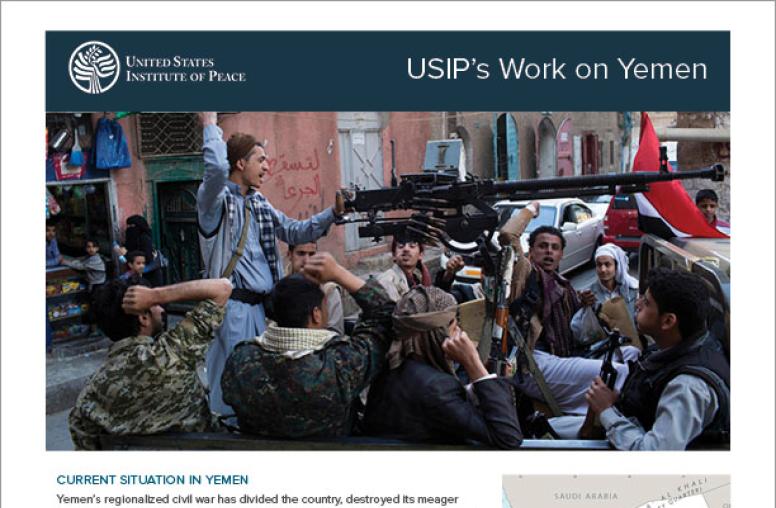Yemen in Transition: Between Fragmentation and Transformation
A combination of a domestic balance of weakness and concerted international mediation efforts moved Yemen away from the brink of civil war. Yet it must still bridge deep divisions among its many factions if its negotiated transition is to last.
Summary
- As other post–Arab Spring transitions have faltered, Yemen has so far defied expectations, moving from the brink of civil war to a managed transition process, under international mediation, that has largely remained on track.
- At the same time, the uprising of 2011 also brought the country's deeper divisions between its multiple power centers to the surface.
- This multipolarity has been a double-edged sword. On the one hand, it has the potential to tear the country apart. On the other, the balance of weakness and military stalemate between rival factions brought the parties to the negotiating table in 2011.
- Multipolarity has allowed for a unique transition process, including the National Dialogue Conference (NDC) that concluded its work on January 25, 2014. It brought youth, civil society, women, and other traditional outsiders to the bargaining table side by side with traditional elites of the country's rival power centers.
- Whether the negotiated transition will yield sustainable results depends on whether the implementation of the results of the NDC strike a balance between the country's frag-mented constituencies.
- Yemeni leadership should establish a mechanism for continued negotiations among southern groups and between the South and the central government to address regional grievances.
- While negotiations between the different power centers must be continued, the key to stability lies in significant government restructuring and reform—some of which has already been agreed upon in the NDC but now must be implemented. In the past, the use of the Yemeni state as a patronage system, poor service delivery, and overly centralized governance have reinforced divisions, feeding instability.
- Resolving these issues will require years, not months, of engagement. A government of technocrats—ideally including some of the NDC's members and/or secretariat—would be best placed to turn the NDC's decisions into action. Since the upcoming constitutional drafting process will inevitably be elite-driven, it is all the more necessary to produce tangible improvements for average Yemenis as swiftly as possible.
- Trust-building measures called for in the NDC will play an important part in transform-ing Yemen's society. Such measures would include empowering the existing commission for land issues and forced retirees in the South and setting up a commission to address the conflict involving the Houthi group in the northwest.
- Regional and international actors have played an essential supporting role as constructive mediators throughout the transition process. Their maintained engagement is indispensable.
About the Report
This report, which is based on a series of lectures organized by the United States Institute of Peace (USIP), explores the rich domestic and external, historic and contemporary factors that have enabled the so-far positive processes of dialogue, peacebuilding, and transitional reform in Yemen in the aftermath of the Arab Spring upheavals. It offers a number of ideas for practical steps that Yemen could take—and that the international community should encourage and support—to achieve greater stability and prevent recurring cycles of violence. USIP is actively engaged in research and programming in Yemen, exploring the prospects for peacebuilding and conflict resolution, and the impact of transition on rule of law and justice concerns.
About the Authors
Deputy head of mission at the German Embassy in Sanaa from 2011 to 2013, Philip Barrett Holzapfel's portfolio included overseeing the political, economic, and development files in Yemen. His focus was to support the NDC and the constitutional reform process. Before his posting in Sanaa, he served in Washington, Ramallah, Cairo, and Berlin. The views expressed in this report are solely those of the author and do not necessarily reflect the official position of the government of Germany or USIP.



